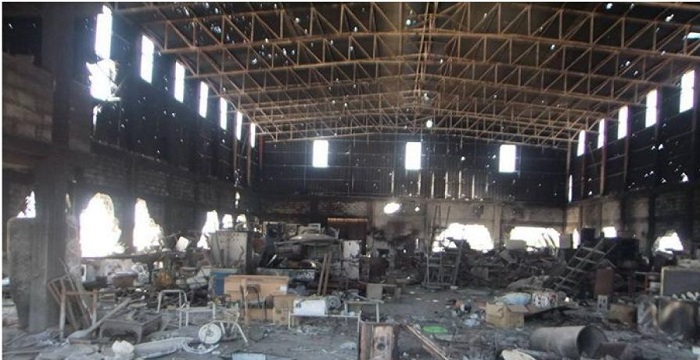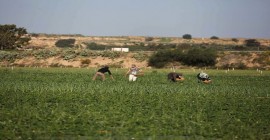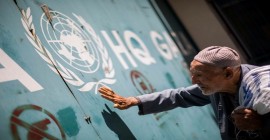Economic Facilities Damaged by the Aggression Remain Uncompensated

Islam Rady – Palestine Economy Portal
Translated by Tamara Barakat
Out of the one million dollar losses incurred by “Al-Silk” textile factory in the Gaza Strip due to the Israeli aggression in the spring of 2014, the factory’s owners did not receive any financial compensations until now.
The manager of the factory, Mohammed Al-Silk, expressed to the Palestine Economy Portal his anger toward the “evaporation” of all of the promises that they received repeatedly on providing them with financial compensations that would help them carry their activities again.
He pointed out that they have received a deferred payment check of $450 thousand as part of the compensation for the factory, but it has not been cashed until now, without any specific explanation from the official parties..
In addition to the losses incurred by the factory and an adjacent warehouse, three houses that belong to Al-Silk family, who lives in the Shuja’iyya neighborhood in the east of Gaza City, were completely burned during the last Israeli aggression on Gaza in July and August 2014.
The consecutive Israeli projectiles targeting the surroundings of the houses and the family’s factory burned all that was in their way, leaving the factory’s employees waiting until now a compensation that would alleviate their continuing crisis.
Losses Exceed $25 Million
The Talabani family lost double the amount incurred by Al-Silk family. Their losses exceeded $25 million after the destruction of their factory that produces ice cream, chips, and biscuits, which is located at the east of Gaza City.
The manager of the Odeh Factory Company, Mohammed Talabani, said that they had not received any financial compensations until now, despite the fact that over a year and a half passed since the end of the latest Israeli aggression,
He mentioned that 450 employees worked at the factory and they are still waiting for its reconstruction and rehabilitation, hoping to be able to return to their jobs.
The hardest thing, according to Talabani, is the absence of a specific timeframe for providing the financial compensations to the economic facilities damaged in the Israeli aggression on Gaza.
5 Thousand Facilities
The Chairman of the Businessmen Association in Gaza, Ali Hayek, told the Palestine Economy Portal, that the aggression in the spring of 2014 directly targeted the economic sector in an unprecedented way, especially the industrial sector.
He explained that around 5 thousand economic facilities were damaged in the last Israeli aggression on Gaza, around a thousand of which were completely damaged, rendering thousands of their employees unemployed.
The damages to the economic sector were estimated at over a billion dollars within the plan presented at the Cairo Conference on the Reconstruction of Gaza, held in Cairo in October 2014.
In this conference, the donor countries pledged $5.4 billion for Palestinians, a half of which would be embarked for the reconstruction of the Gaza Strip.
However, Hayek confirmed that the compensations received by the owners of economic facilities in Gaza did not exceed $9 million, “which reflects the lack of seriousness in finding donors to fund the reconstruction of the factories, even though their destruction made thousands of workers homeless.”
Hayek criticized the Government’s negligence in compensating the factory owners despite the repeated official promises to do so. He also criticized that no governmental fund has been formed for this purpose.
Moreover, the Palestinian Ministry of Economy estimated that it needs $203 million for financially compensating the damaged economic facilities.
The undersecretary of the Ministry in Gaza, Hatem Aweida, told the Palestine Economy Portal that these $9 million were provided in two installments and they benefited 3195 facilities. This only covers 5% of the losses incurred by the Gaza Strip.
Kuwaiti Grant
Aweida pointed that the grant that Kuwait intends to provide for those harmed in the private sector amounts to $18 million, $9.5 million of which will be spent on the external structure of the factories, and $8.5 million of which will be compensations for the damaged industries, especially the construction, wood, aluminum, and food industries. It was agreed to give priority to the construction industry to allow it to contribute to the reconstruction of the Strip.
The National Unity Government earlier declared that it received less than 30% of the international pledges made for the reconstruction of the Gaza Strip. This impeded the majority of the reconstruction processes, and Israel’s restrictions on importing the building materials needed for the reconstruction continued.
Aweida said that all economic activities are affected by the halt in the reconstruction, especially since the construction sector employs around 45 thousand people, the majority of which are currently unemployed because of the slow pace of the reconstruction and the lack of investment projects.
He also added, “The economic activity in Gaza is standstill, the blockade is still forcefully imposed, and the Israeli occupation manages this blockade and still keeps a list of raw materials that are prohibited to be imported, which halted several industries and created a great deficit in the local economy.”
The Minister of Economy in Gaza demanded the donor countries and bodies to haste in providing the needed support to the Strip, in order to allow the reconstruction and rehabilitation of its damaged facilities and compensate it for the huge losses incurred by it due to the Israeli aggression on Gaza. He demanded that they commit to what they pledged for the reconstruction of the Strip.





